Best PDW: Which Is Best For Your Needs?
There are several different niches of firearms with specific names. To the less knowledgeable, the term personal defense weapon, or PDW, sounds like it could be any weapon used for the self-defense of a person. To be fair, it is, but in the gun world, the term PDW is quite specific. A personal defense weapon typically refers to a submachine gun-sized weapon that fires a round that lands someplace between a pistol and rifle round.
The phrase first came around in the 1980s. NATO was looking for a platform that could be issued to non-frontline troops that were better than a pistol but less cumbersome than a standard rifle. The idea was this weapon would arm truck drivers, artillerymen, and similar roles. It had to be small and light like an SMG but be capable of firing rounds further than handguns and retaining the ability to punch through light armor and barriers.
This was not the first time a military force had this idea, but it was the first time they applied a particular name to it. Since then, the PDW concept has largely faded away from military use, but it is still an interesting idea for the civilian home defender. Interestingly enough that the PDW cartridges and guns to accommodate them are coming into vogue.
Why the PDW ?
The main benefits of the PDW are a light and short platform with minimal recoil and the capability to reach out to 150 yards or so with a rather flat shooting cartridge. These guns can have barrels as short as 8 inches without having the same massive concussion you’d get from a 5.56 caliber rifle or the associated recoil.
This creates a very easy-handling platform. The rounds these weapons fire are small and light and allow the weapons to be compact. Additionally, these rounds have the ability to tumble and fragment like a standard rifle round. This helps with their lethality and ability to stop a threat.
PDWs make for excellent home defense platforms. They are maneuverable in tight environments. They are light enough to be fired with one hand, which may be important as you call the police, usher children away, or lock doors. They excel in their intent to provide a lightweight, controllable, but capable weapon platform for defensive use.
Downsides to the PDW
While the rounds have some rifle-like qualities, they are not rifle rounds. They don’t go through the same barriers or armor with the same ease. They can’t reach out exceedingly far, and the velocities in which these rounds can tumble and fragment are only found at short ranges.
One of the biggest downsides is the cost of ammo. Unlike handgun rounds, cartridges like the 5.7×28 or 4.6x30mm tend to be expensive. Plus, they are not always easy to find.
Another issue is the overall design and our federal laws. PDWs are best when they are compact weapons, and typically, this involves a stock. The best PDWs will mostly be SBRs. A braced pistol could qualify, but as we all know, a brace isn’t a stock.
With this in mind, let’s review the best PDWs on the market.
Best Personal Defense Weapon
The table below ranks our favorite PDW. Click the gun names to jump straight to the review or just scroll down to read through them all.
Our Best PDW
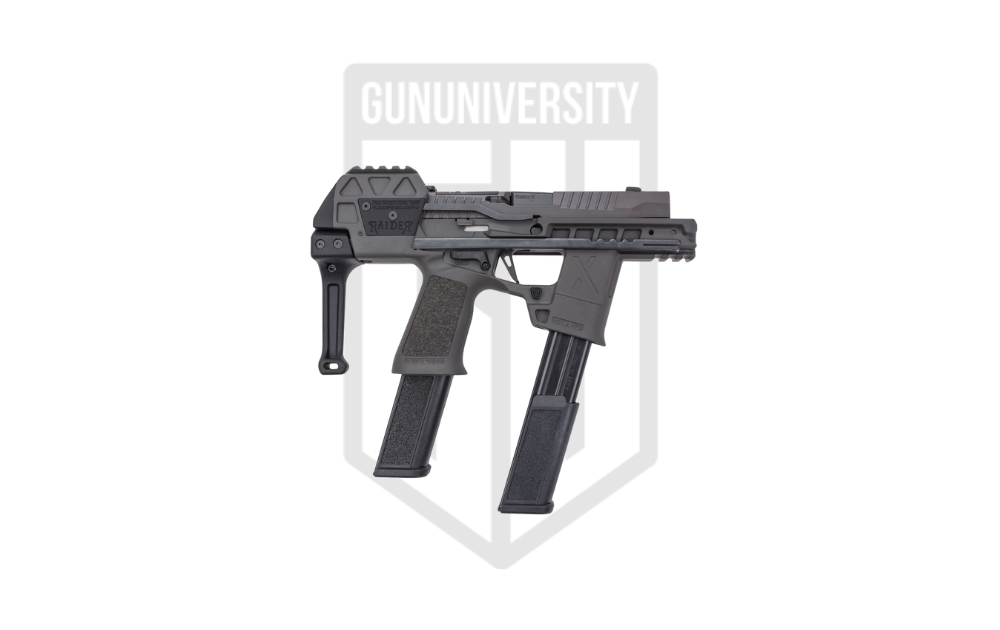 |
| See Price | |
2. B&T TP9 | 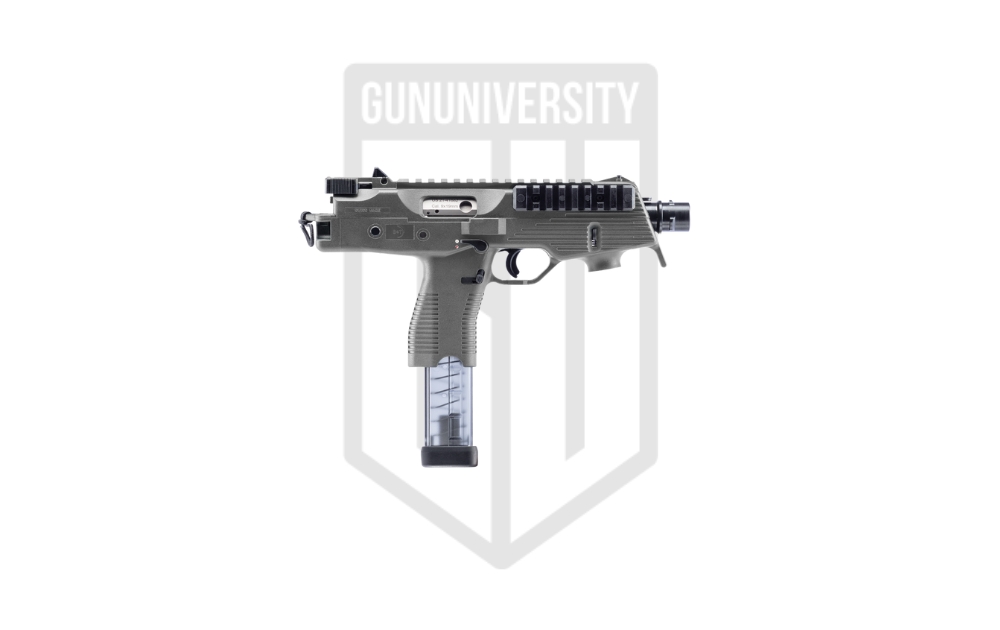 |
| See Price |
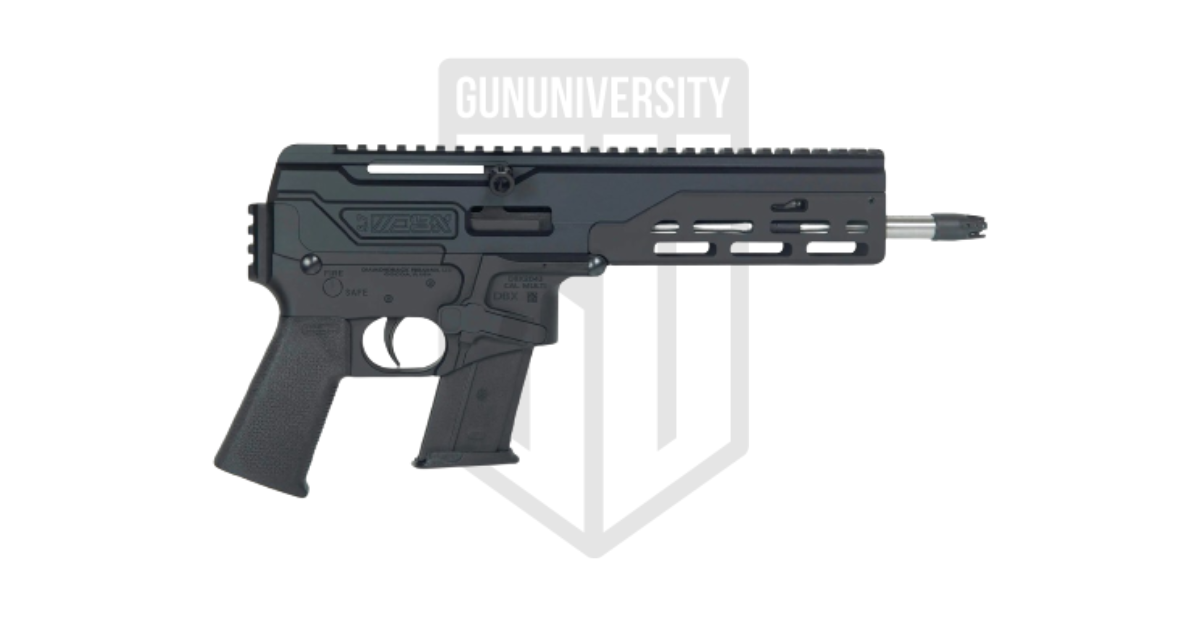 |
| See price | |
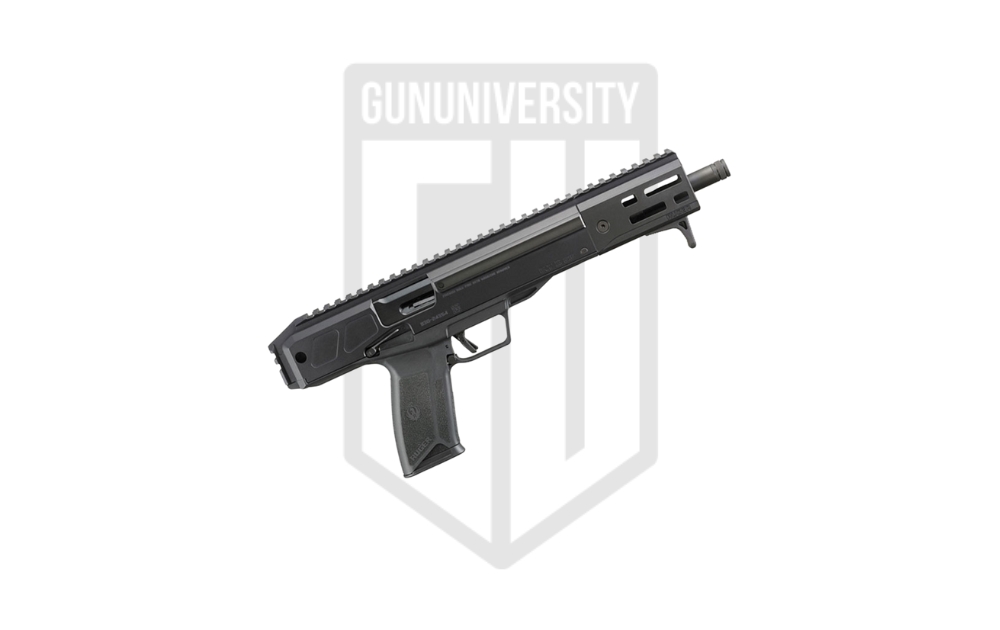 |
| See Price | |
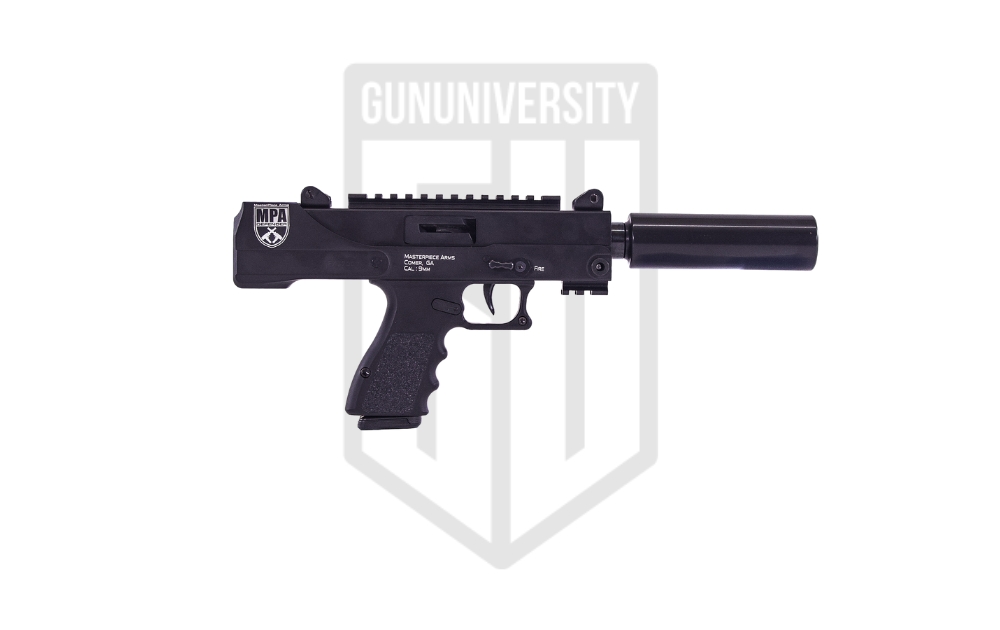 |
| See Price | |
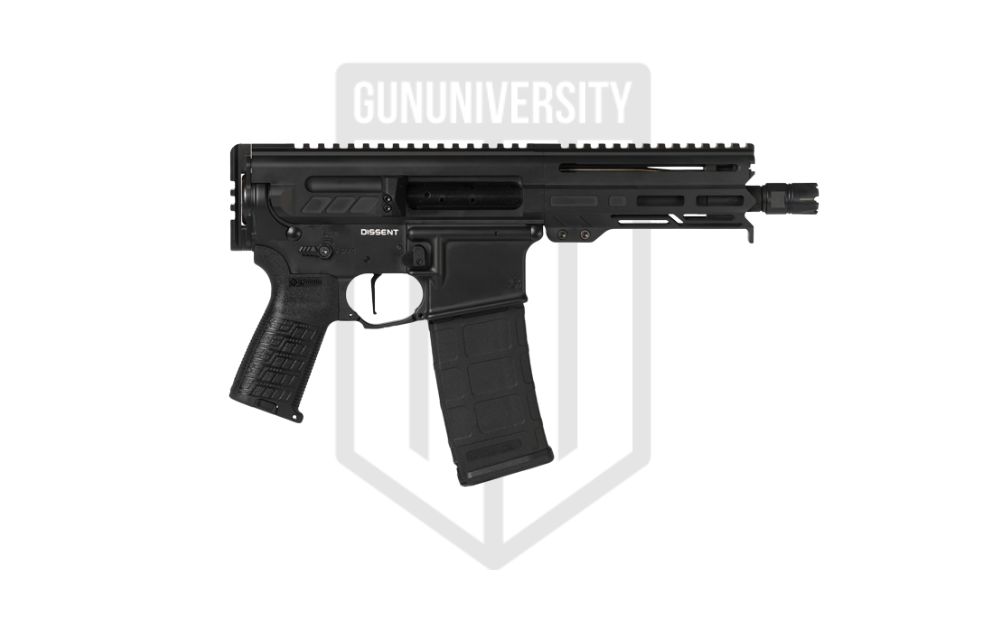 |
| See Price | |
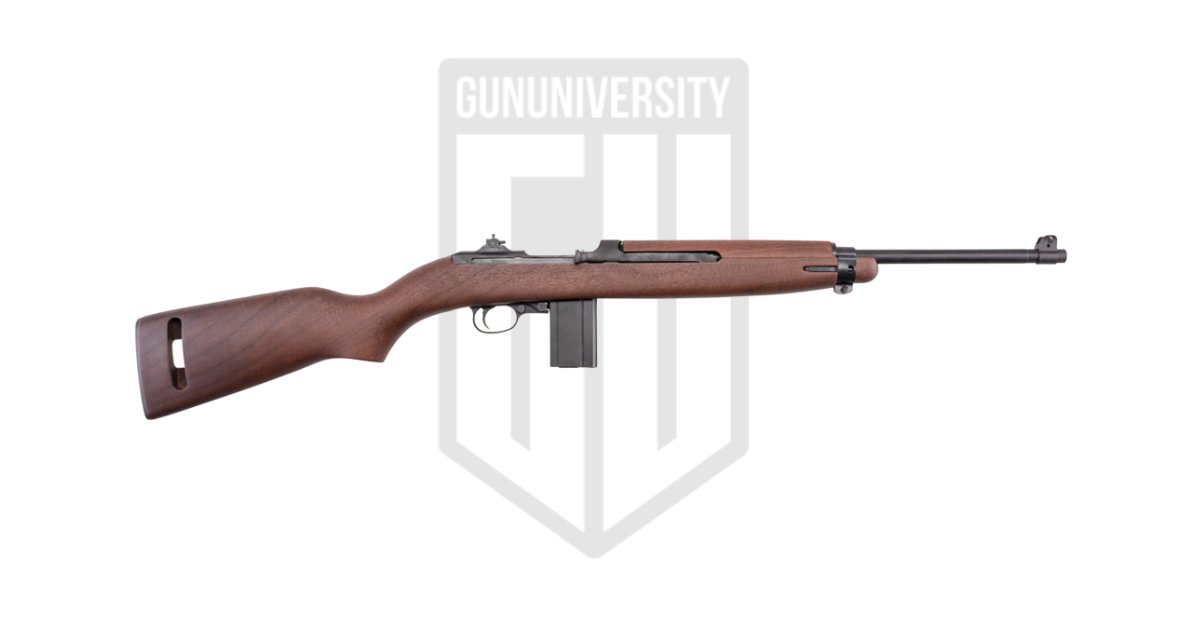 |
| See Price |
Best PDW Gun Specs
| Weapon | Caliber | Barrel Length | Overall Length | Weight |
|---|---|---|---|---|
| 9mm | 4.7 in | 19 in | 2.5 lbs | |
| 9mm | 5 in | 11.9 In | 3.75 lbs | |
| 5.7x28mm | 8 in | 15.25 in | 3 lbs | |
| 5.7x28mm | 10.3 in | 16 in | 4.15 lbs | |
| Masterpiece Arms MPA30DMG | 9mm | 4.5 in | 11.25 in | 3.62 lbs |
| 5.56 NATO / .300 Blackout / 5.7x28mm | 6.5 in | 14.7 in | 4.8 lbs | |
| .30 Carbine | 18 in | 35.75 in | 5.4 lbs |
Best PDW List
Here is our list for the best PDW.
- Flux Raider
- B&T TP9
- Diamondback DBX
- Ruger LC Charger
- Masterpiece Arms MPA30DMG
- CMMG Dissent
- M1 Carbine
Best PDW Reviews
Now lets get into the details of each of our favorite PDW options and find out what we like about it and if it will fit your needs.
#1 Flux Defense Raider
Flux Defense Raider
The Flux Defense Raider takes a P320 and turns it into a PDW. This chassis system has bene popular enough SIG now produces a Legion variant with Flux Defense
- Shootability A
- Reliability A+
- Ergonomics A+
- Accuracy B+
- Value B
Our Grade
A-
Reader’s Grade
TBD
Based on 0 Reviews
Your Grade
Do You Own This Gun? Leave A Review
Success Your Grade Has Been
Added To Our Reader’s Score
We use email to verify the accuracy of our reviews. We promise to never spam you.
Flux Defense Raider Review
Flux Defense Raider
- Caliber 9mm
- Barrel Length 4.7 in
- Overall Length 19 in
- Weight 2.5 lbs
The Flux Raider isn’t a gun but a P320 grip module. It’s arguably the most significant P320 grip module and the most advanced ever to exist. Alternatively, Fuux and SIG partnered to produce a Legion version, which is a complete firearm. With the standard Raider, users drop in their fire control group and slide, creating a Flux Raider. The Flux Raider is one of the biggest grip modules but one of the smallest PDWs.
The Flux Raider is a very compact setup. Depending on your configuration, the brace or stock deploys with a lever’s press. It deploys fast and hard; you’re ready to go from slow to rock and roll in seconds. Up front, the spare mag holder lets you quickly and easily reload the gun. Multiple reload methods exist, including a button that drops the mag in the gun and the spare mag slot.
The Raider system allows you to extend your control, accuracy, and range. This PDW can extend your range to 100 yards quite easily. It’s easy to land consistent hits on a man-sized target at various ranges outside of what your typical handgun offers. The brace adds control, allowing you to shoot faster without degrading accuracy.
In practice, I’ve never run into reliability issues. It’s super easy to use, and like any modern design, it can be accessorized easily. Adding optics and a light or even a laser isn’t tough to do. You aren’t stuck with your typical handgun-sized optics and go a bit bigger if you choose to do so. The Raider is one of the most competent PDW options on the market.
Flux Defense Raider Pros and Cons
- Lightweight and Compact
- Ultra Easy to Shoot
- Awesome Ergonomics
- Quick Deploy Brace
- Expensive
#2 B&T TP9
B&T TP9
The B&T TP9 is a refined PDW with all the Swidd perfection you could imagine. It’s light, handy, and very capable.
- Shootability A+
- Reliability A+
- Ergonomics A-
- Accuracy A+
- Value C-
Our Grade
A-
Reader’s Grade
TBD
Based on 0 Reviews
Your Grade
Do You Own This Gun? Leave A Review
Success Your Grade Has Been
Added To Our Reader’s Score
We use email to verify the accuracy of our reviews. We promise to never spam you.
B&T TP9 Review
B&T TP9
- Caliber 9mm
- Barrel Length 5 in
- Overall Length 11.9 in
- Weight 3.75 lbs
B&T USA has brought up the TP9, which is a pistol variant of the MP9 submachine gun. The TP9 and MP9 are derived from the Steyr TPM and SPP. The B&T versions are the most advanced variants of this design. The TP9 is a 9mm, semi-auto handgun that is a bit bigger than your usual handgun but uber small for a subgun. The TP9 can be easily turned into an SBR, or can wear a brace with ease.
As a PDW, the TP9 offers you a large, easily accessorized platform. Using a brace or stock allows you to increase your range and control very easily. With just a little practice, your average user will be able to land a sub-two-second Bill Drill with a braced TP9 wearing a red dot. The system used a delayed blowback system with a rotating barrel design, which cuts recoil significantly and creates a fairly pleasant shooting weapon.
The TP9 has excellent ergonomics that allow both right and left-handed shooters an easy way to control the gun. We are stuck with a rather odd trigger which is left over from the machine gun design. It’s got a long pull but a decent break and short reset. It takes some getting used to. Reliability isn’t a concern, and when you press the trigger, you know the gun is going to fire, cycle, and be ready to fire again.
Like anything B&T, you are paying a premium. The TP9 hits that two-grand mark, which is nuts for a big 9mm handgun that’s mostly polymer. You are also stuck with the B&T magazine, and if you want a can, B&T is the only one that makes a TP9-compatible suppressor. If you can get past that, this is a finely tuned Swiss PDW.
B&T TP9 Pros and Cons
- Super Compact
- Light Recoil
- Accurate
- Expensive
#3 Diamondback DBX
Diamondback DBX
A low profile soft shooting PDW utilizing a dual gas piston and a locked breech.
- Shootability A
- Reliability A
- Ergonomics A+
- Accuracy B
- Value B
Our Grade
A-
Reader’s Grade
B-
Based on 3 Reviews
Your Grade
Do You Own This Gun? Leave A Review
Success Your Grade Has Been
Added To Our Reader’s Score
We use email to verify the accuracy of our reviews. We promise to never spam you.
Diamondback DBX Review
Diamondback DBX
- Caliber 5.7x28mm
- Barrel Length 8 in
- Overall Length 15.25 in
- Weight 3 lbs
The Diamondback DBX might be the thinnest PDW out there. Diamondback sells these guns as a large-format pistol, so a brace may help stabilize the design. Even without the brace, it’s not too hot to handle and is easy to control and keep on target. The gun weighs a mere three pounds and is 15.25 inches long overall. It certainly fits the compact requirement of PDWs.
The DBX uses a dual gas piston system with a locked breech, so recoil is kept low and easy. The eight-inch barrel keeps things short but provides a nice amount of velocity to make the 5.7x28mm round it fires scream. A focus on ergonomics makes the gun easy to handle and ergonomic for both left and right-handed shooters.
This soft shooting little menace is fun at the range and very easy to get lead on target with. The short little gun is very maneuverable and easy to use without a brace, but one really helps keep the gun stabilized. While it’s not cheap, it’s one of the more affordable options for a PDW. The weapon uses FN Five-Seven magazines, so you have at least 20 rounds on tap.
Diamondback DBX Pros and Cons
- Very Lightweight
- Super Compact
- Affordable (For a PDW)
- Easy Ergonomics
- Needs a Brace to Excel
- Expensive Magazines
#4 Ruger LC Charger
Ruger LC Charger
The Ruger LC Charger is a lightweight, large-format pistol with a classic PDW cartridge. This brace, optics, and light-ready PDW is begging to defend you and yours.
- Shootability A+
- Reliability A+
- Ergonomics B
- Accuracy A-
- Value B
Our Grade
A-
Reader’s Grade
TBD
Based on 0 Reviews
Your Grade
Do You Own This Gun? Leave A Review
Success Your Grade Has Been
Added To Our Reader’s Score
We use email to verify the accuracy of our reviews. We promise to never spam you.
Ruger LC Charger Review
Ruger LC Charger
- Caliber 5.7x28mm
- Barrel Length 10.3 in
- Overall Length 16 in
- Weight 4.15 lbs
Ruger producing a PDW? Who would have thunk it? The Ruger LC Charger is the larger format pistol of the LC Carbine, a 5.7x28mm rifle. The pistol variant cuts the barrel to 10.3 inches, which gives the 5.7x28mm enough barrel to reach peak velocity. The Charger forgoes a stock, but a 1913 rail makes it easy to add a brace to create a modern, American-made 5.7x28mm PDW.
The 5.7x28mm cartridge does a few things very well. First, it has hardly nay recoil. THis makes the LC Charger extremely easy to control and shoot. We are looking at near .22 Magnum levels of recoil, so basically none. This makes it easy to dump rounds into targets without losing control of the gun. Second, the 5.7x28mm offers excellent range, and shots to 200 yards are entirely possible.
It’s a charming and fun gun to shoot. It’d be an awesome choice for a very recoil-sensitive shooter who still wants centerfire reliability. The ability to shoot 10 rounds as fast as possible and the gun barely move is massively helpful for the recoil sensitive.
The LC Charger offers a somewhat affordable option with a very modern layout. The magazine sits in the pistol grip, so the gun remains very compact. The magazine is a Ruger 5.7 pistol magazine, so they are plentiful. There is a massive rail across the top and plenty of M-LOK area for accessories.
It’s 16 inches long overall with a brace and weighs over 60 ounces. It’s not the smallest PDW, and it’s most certainly not the lightest. However, it’s American-made, easy to find, and a bit more affordable than the other options on this list.
Ruger LC Charger Pros and Cons
- Brace Ready
- Low Recoil
- Affordable(ish)
- Expensive Ammo
#5 Masterpiece Arms MPA30DMG
Masterpiece Arms MPA30DMG
The MPA30DMG is a modern take on the MAC series of pistols. This one takes Glock mags, accepts optics, and is an affordable PDW.
- Shootability B
- Reliability A+
- Ergonomics B
- Accuracy B+
- Value A+
Our Grade
A-
Reader’s Grade
F-
Based on 1 Reviews
Your Grade
Do You Own This Gun? Leave A Review
Success Your Grade Has Been
Added To Our Reader’s Score
We use email to verify the accuracy of our reviews. We promise to never spam you.
Masterpiece Arms MPA30DMG
Masterpiece Arms MPA30DMG
- Caliber 9mm
- Barrell Length 4.5 in
- Overall Length 11.25 in
- Weight 3.62 lbs
The vast majority of these PDWs seem to cost an arm and a leg. Most of us don’t have two grand to spend on a fairly niche defensive weapon. With that in mind, I have a fun budget option. The Master Piece Arms MPA30DMG offers a small, lightweight, light-on-the-pocket book PDW candidate. The name is too long, but the MPA30DMG offers us the best combination of value and performance.
These are essentially MAC-10 clones modified to be a bit more modern. The MPA30DMG variant even uses Glock magazines, which is why it gets top marks. The gun doesn’t come brace-ready, but various brace adapters are readily available. Unlike standard MACs the gun is a side charger, which allows for a rail and optics to be an easy addition to the weapon.
These are straight blowback guns, so the recoil is more intense than most. It’s still just a 9mm, but it’s a lot of recoil for a 9mm. A brace helps a lot and is a must-have for PDW use. I can still shoot fast with total control, but not as fast as more refined an more expensive options. You can ditch the silly fake suppressor. These guns won’t win ergonomic awards. They are just kind of awkward but functionally fine.
They are reliable and surprisingly accurate. The MPA30DMG can throw those 9mm pills out to 100 yards with an optic and brace. At 50 yards in, it’s an extremely capable gun. The trigger isn’t great, and the grip might be awkward, but I can get over it and make steel ring. It’s not a fancy gun, but it’s a PDW you can get into for less than a thousand dollars.
Masterpiece Arms MPA30DMG Pros and Cons
- Affordable
- Takes Glock Mags
- Easy Modularity
- Needs a Stock or Brace
#6 CMMG Dissent Mk4
CMMG Dissent Mk4
The Dissent is an AR anomaly that uses a proprietary compact action instead of the typical buffer system.
- Shootability B
- Reliability A
- Ergonomics A+
- Accuracy B
- Value C
Our Grade
B+
Reader’s Grade
TBD
Based on 0 Reviews
Your Grade
Do You Own This Gun? Leave A Review
Success Your Grade Has Been
Added To Our Reader’s Score
We use email to verify the accuracy of our reviews. We promise to never spam you.
CMMG Dissent Mk 4 Review
CMMG Dissent
- Caliber 5.56 NATO / .300 Blackout
- Barrel Length 6.5 in
- Overall Length 14.7 in
- Weight 4.8 lbs
The CMMG Dissent is kind of an AR-15, but not really. The gun lacks a buffer tube and instead uses a receiver integral buffer system similar to the AR-180 series of rifles. It produces a much shorter weapon that can accept folding braces or stocks. (Stocks require an ATF Tax Stamp.) The Dissent comes in three calibers, and only two are what I would consider for a PDW. You can pick from a 5.56, a 5.7x28mm, or a .300 Blackout.
With a 6.5-inch barrel, only the .300 Blackout and 5.7x28mm make much sense. In these two calibers, you get good performance from the respective rounds. The Dissent offers you an M-LOK rail, an optic rail, and a 1913 rail for stocks of braces. The charging handle is moved above the barrel, where it works much like an MP5.
The resulting gun is a loud but lightweight and compact PDW. Beyond the charging handle, the ergonomics mimic that of a well-made AR-15. This includes an ambidextrous magazine release and safety. It’s quite smart. In 5.7, it is a very controllable gun, and in .300 Blackout, the recoil is kicked up a notch, but not exceedingly so.
Read the Full CMMG Dissent Review here.
CMMG Dissent Pros and Cons
- Lightweight and Short
- Great Ergonomics
- Multiple Caliber Options
- Fun to Shoot
- Expensive
- Needs a Brace or Stock to Shine
-
$1,809.99
-
$1,939.99
-
$1799.99
#7 M1 Carbine
M1 Carbine
An iconic, and perhaps the original, PDW from WW2 chambered in .30 carbine.
- Shootability A
- Reliability B
- Ergonomics C
- Accuracy A
- Value B
Our Grade
B+
Reader’s Grade
A+
Based on 3 Reviews
Your Grade
Do You Own This Gun? Leave A Review
Success Your Grade Has Been
Added To Our Reader’s Score
We use email to verify the accuracy of our reviews. We promise to never spam you.
M1 Carbine Review
M1 Carbine
- Caliber .30 Carbine
- Barrel Length 18 in
- Overall Length 35.75 in
- Weight 5.4 lbs
My final choice is the original PDW, the M1 Carbine. This gun was produced to provide truck noncombat troops with an alternative to the handgun. It became a popular choice up until Vietnam, and it is still produced to this day. These rifles are light and handy but not the shortest platform out there. Pistol variants exist, but I’d stick to the rifle with a barrel long enough to throw those .30 Carbine rounds hard and fast.
The M1 Carbine is also tough to accessorize, but modern reproductions have made it easier to add red dots, slings, and various other accessories. The little rifle is a classic shooter, and its older design can often make it a good choice for states with restrictive gun laws. Just ensure the bayonet lug is removed, and it’s likely legal in most states. You are stuck with ergonomics from the 1940s.
The M1 Carbine doesn’t fire the most PDW type of round. It’s a bit closer to a pistol round than a rifle round. Even so, it’s more powerful than any standard pistol round. The downside to this platform is the price of the ammo. The guns can be had for an affordable price point, but the ammo tends to be a bit pricey. Also, make sure you invest in proper magazines.
M1 Carbine Pros and Cons
- Ban State Friendly
- Easy to Handle
- Easy to Shoot
- 1940s ergonomics
- Expensive Ammo
PDWs do have several great benefits but available downsides. You have to really understand the effective range and capabilities of these platforms. Learn the limits of your specific caliber and how the barrel length affects those limits and velocities. Be smart. These are not normal firearms ballistically, and it requires some research to understand and appreciate them truly.
The civilian PDW is unlike most other firearms but still functions like a semi-auto rifle. With that in mind, it’s smart to practice traditional riflery skills as well as learning to use the PDW as a home defense weapon. Like any other weapon, you should learn to fire around cover and operate the weapon with both left and right hands.
On the flip side, a PDW has the strength of being easy to handle with a single hand. Embrace that skill and practice with it. Learn to operate or at least fire the weapon one-handed at close ranges.
Double taps are another important skill to work on, and it’s likely that an engagement with a PDW-type weapon will require more than one round to stop the threat. Work those double taps and learn to control the weapon and fire it rapidly and accurately.
A good source of training is to look up submachine gun qualifications used by police or military forces. The Department of Energy has a great SMG qual worth trying out.
PDWs vs. PCCs
Pistol caliber carbines and personal defense weapons seem to have a lot in common but are very different weapons. Both are typically short and lightweight and tend to be easy to handle. The main difference comes down to their ammunition type and operating systems. Pistol caliber carbines tend to throw bigger rounds but throw them with less velocity and less range.
They tend to be 50 to 100-yard guns at max. Even at 100 yards, the bullet drops quickly and hard. A PDW can launch projectiles out to 150 yards fairly easily and even further when you adjust for drop. PDW rounds tend to be spitzer-style projectiles that hit and tumble at velocities.
From a pure self-defense role, the PDW excels. They tend to be light recoiling since most PCCs use a straight blowback system. Even when PDW calibers use a straight blowback system, their recoil is lighter than a comparable PCC.
When we get to 16-inch barrels, PDWs still do better. In fact, since most pistol ammo is made for pistol-length barrels, jacketed hollow points tend to suck at expansion from a rifle-length barrel. You’re stuck with subsonic, heavy loads if you want sufficient expansion.
PDW Calibers
PDWs come in a few different calibers, and it’s easy to argue what qualifies as a PDW caliber and what doesn’t. However, I will list some of the basic calibers here, with a slight explanation of their design and use. These are calibers available to the civilian world, don’t expect to see .224 Boaz here.
5.7x287mm – FN invented this caliber for the P90, and it’s arguably the most popular ‘pure’ PDW cartridge. It’s in a number of handguns and rifles, and the ammo tends to be somewhat easy to find but is expensive. With its recent revival and success, ammo has been easier to find and slightly cheaper.
4.6x30mm – HK invented this caliber but never released the gun that fires it to the public. It wasn’t until last year that CMMG released the FourSix that we got the first 4.6x30mm civilian-owned firearm. This caliber has the potential to be cheaper than 5.7, but it will require more adoption to ever see that. Expect to pay the price for ammo and have a tougher time finding it.
.300 Blackout -Typically seen as a rifle caliber and not a PDW cartridge. However, it’s worth noting the original intention of the round was for more PDW-like activities. This is a .30 cal round seated into a 5.56 case, essentially. This allows the use of sub or supersonic rifle ammo without functionality issues. It excels from short barrels and reaches full velocity from a 9-inch barrel. It also suppressed very well.
.30 Carbine – The OG of PDW caliber is the .30 Carbine. At the time, it was called a light rifle cartridge, but the intent was the same as the PDW. It’s a ball around, but when paired with proper hollow tips, it’s an excellent option for home defense. It’s not superbly popular, but a handful of rifles and handguns have been created to fire it.
The Personal Defense Weapon
I think what keeps PDWs from being more popular is the price of the ammo. It’s a niche round that doesn’t perform at the same level as something like a 5.56 round, but 5.56 remains cheaper. If the price lowered to nearly pistol-round ammo, I’m betting we’d see a lot more PDW action. Sadly, until that happens, it can be tough for some to justify the switch.
In my opinion, the PDW can be a great home defense firearm, but you have to be willing to do the work. It’s perfect for those with lower strength levels, or even new or occasional shooters seeking a great home defense option, but it’s not always plug-and-play like an AR or even a PCC.
Recent Posts
February 19, 2026
February 19, 2026
February 17, 2026
February 17, 2026

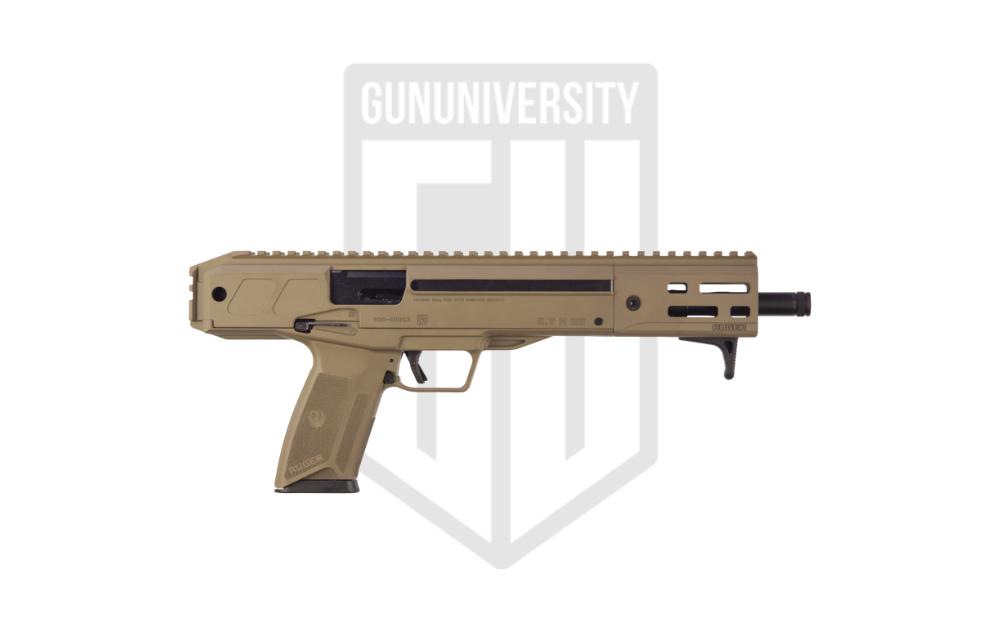
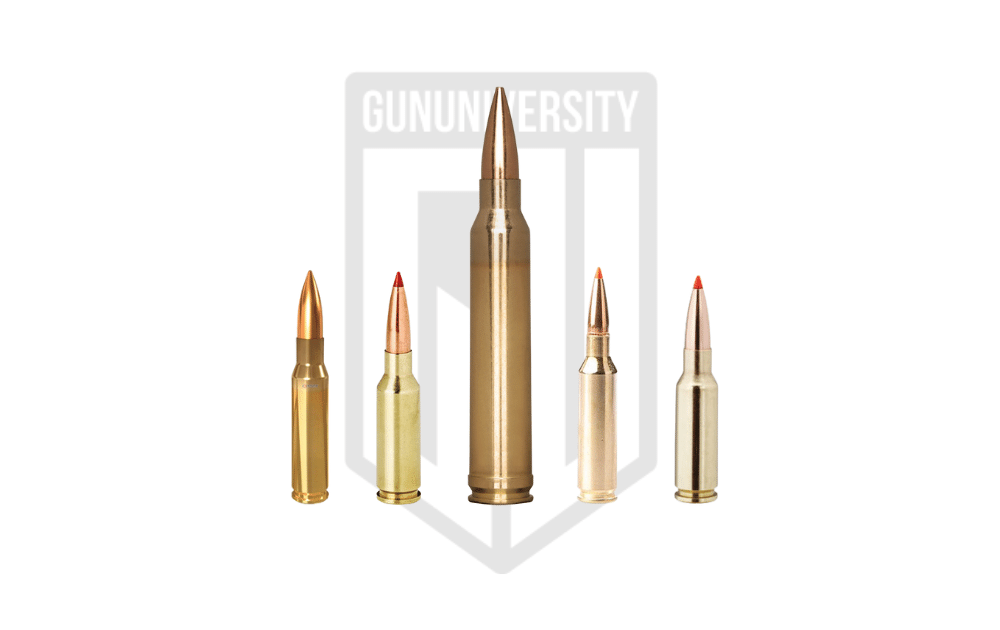
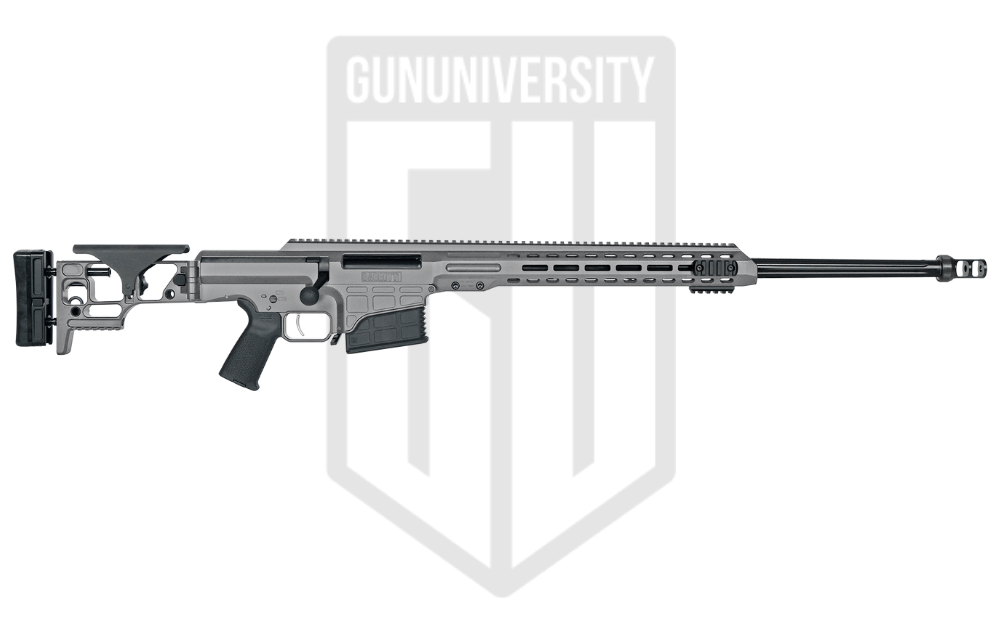
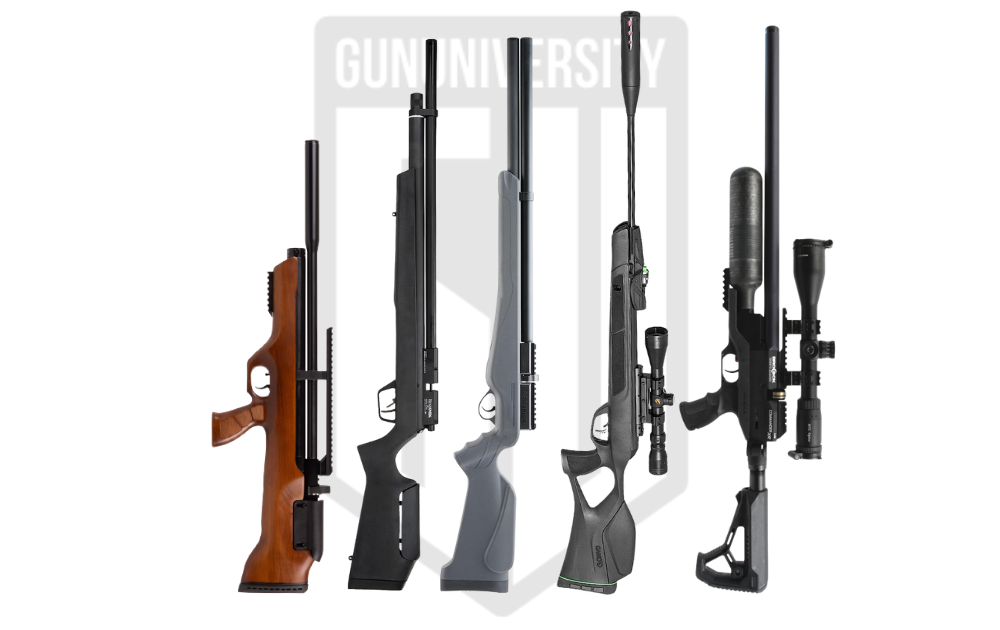
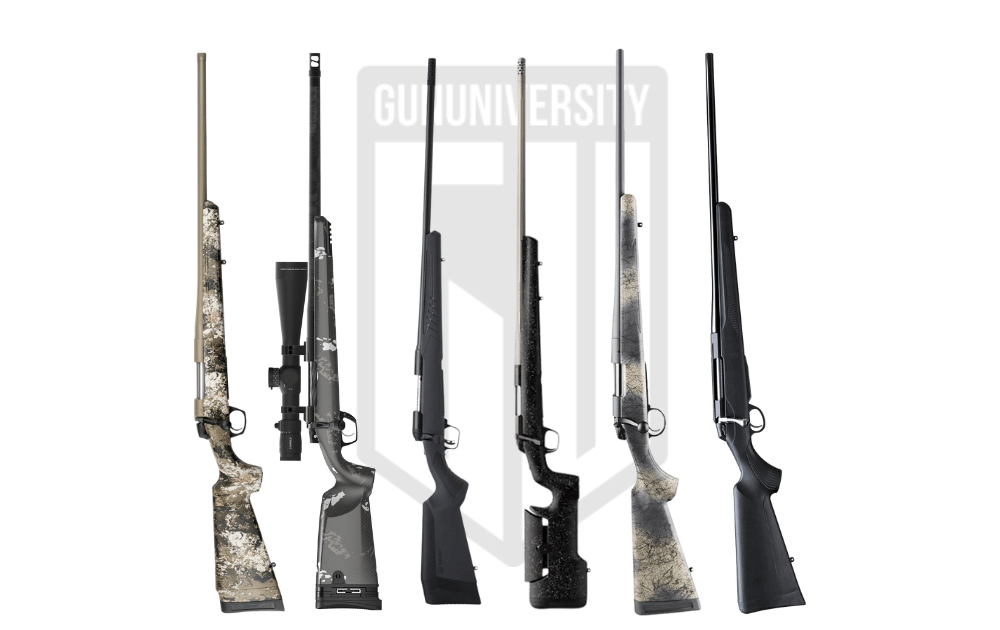
IVe owned a M1 Carbine in 30cal since 1975…Never an issue, weapon still fires straight and true.
Every now and then I’ll run out to the farm with this M1 Carbine and my M1 Gran in 30-06 for a old school day of shooting…
Hard to believe we won a world war with these weapons…But it was 1941-1945…Ping 7 butter gone.
US Military Retired